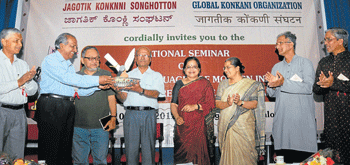'Use of scripts marker for one's culture, identity'
National seminar on scripts, languages of modern India begins

The domain of a script and that of a language are distinct but related. A language looks to a script to express itself beyond the zone of the familiar and intimate and a script has no meaning without being the bearer of symbols and meanings structured in a language, said Jawaharlal Nehru University Centre of Political Studies Professor Valerian Rodrigues.
He was speaking after inaugurating the national seminar on “Scripts and languages of modern India, with special reference to Konkani” organised by Global Konkani Organisation at Kalaangann in Mangalore on Saturday.
Konkani is a language that is spoken by about two million people in the West Coast of India and is written in several scripts such as Devanagiri, Roman, Kannada, Malyalam, Gujarati and Urdu.
The use of these scripts has been done for ages and is an important marker for one’s culture and identity, said Rodrigues.
In the recent years, the association of Devanagiri with a hallowed tradition and particularly with Sanskrit has made sections of the Konkani speaking upper castes in the coastal areas of Karnataka to veer round to the Devanagiri script, he said and added that the issue has become highly diverse with the starting of Konkani in schools in recent years. “Outside Goa, and particularly in Karnataka, these schools themselves were the outcome of hard-fought battles with the dominant languages of the region,” he pointed out and added that the script controversy is deeply mired in political contentions.
Konkanis were fairly united in their struggle for recognition of the language in the Constitutional Schedule and by the Central Sahitya Academy. However, over the years there is a growing feeling among the non-Devanagiri Konkanis that the Sahitya Academy has tended to favour Konkani literature written in Devanagiri. Script therefore has become a deeply divisive issue with regard to the larger recognition.
Speaking about resolving the Konkani script conundrum, Rodrigues said that some technical issues, such as simultaneous translation of scripts, could be attended by technology.
However, Konkanis need to rally in defense of the rights of Konkanis as lingustic minorities more importantly. If they do not, then not merely their numbers but their cultural belonging as a whole is likely to be badly affected, he said.
He pointed out that no one can prevent anyone from writing and publishing in the script they are familiar. But such writing should be encouraged and supported through public resources and to what extent is the support is a question to be discussed, he said.
Global Konkani Organisation General Secretary Eric Ozario pointed out that script is only a vehicle to express a language. Language is primary and script is secondary.
The issue of dialect is directly linked with the issue of script. Many a times, while attempting to impose a particular script, what is really sought to be imposed is a particular dialect. The issue of script in Konkani is more a political issue used as a political weapon against other script groupings, he said.
“Unity among any people can be achieved only by respecting all varieties and not by imposing one and destroying the others. The slogan-‘ek bhas, ek lipi, ek sahitya, ek samaz’ smacks of Fascism and is very dangerous for the future of Konkani. ‘Respect for every variety’ and ‘Unity in diversity’ should be a mantra for Konkani,” he said and added that the issue of the ‘official script’ of Konkani can not be decided by a handful of people belonging to one script variety.
“The primary issue is whether we opt for a ‘single script’ or should continue to remain multi-script language group,” is a question, he concluded.
“Script has unfortunately been taken as a marker to mark the identity. However, in case one changes a script overnight than an entire community will be illiterate,” said Jawaharlal Nehru University Professor of Lingusistics Dr Anvita Abbi.